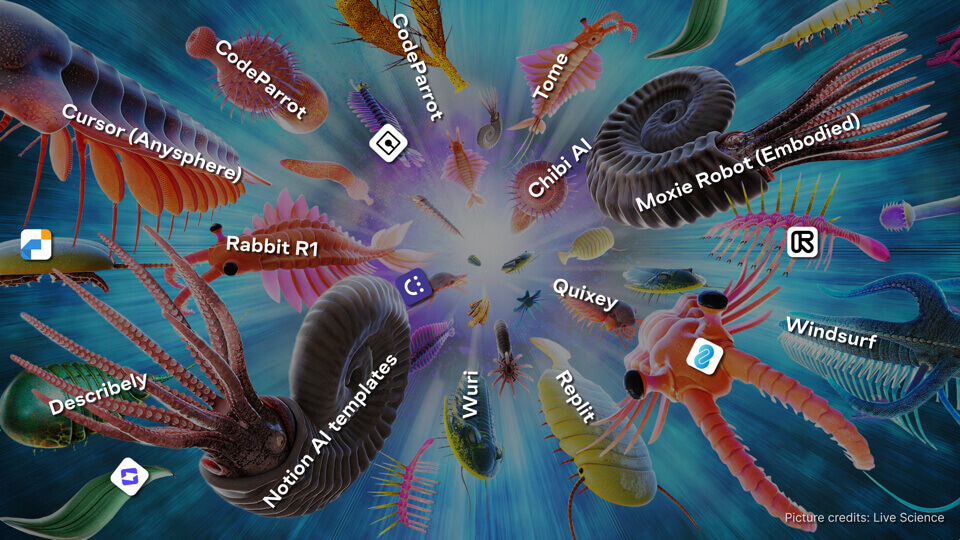
Product Development 101: What Founders Need to Build Right in the AI Era
Investors fund traction.
Traction requires ~10x better product performance than status quo.
What specific user behaviors would convince someone your product has real traction?
Post-Cambrian explosion: Rapid AI product launches, followed by rapid extinction.

Most AI products fail due to poor execution, unclear UX, and lack of user trust.
How are you addressing execution risk?
Codewalla is a NYC-rooted AI-native product studio.
We partner with startups and enterprises to de-risk product development. We use three lenses to guide product clarity and traction.

LENS 1: Investor Lens
What investors look for — and how it’s changed.
Market, Early traction, Sharp problem, Focused solution.
AI changes expectations:
Model access is not a moat. What gives your product enduring leverage beyond the underlying model?
Modern fundable signals:
Usage depth, compounding systems, clear wedge. Where are you seeing real user pull — retention, repeat behavior, or feature demand?
Credibility risks:
Vague AI claims, shallow adoption, overbuilt MVPs. Is your current product scope helping or hurting your credibility?
SignalFrame (Case Study)
Ambient Manager Assistant
Pitch works because the product delivers behavior change. What is the smallest version of your product that reveals the long-term vision?
LENS 2: Product Craft Lens
What hasn’t changed — even in an AI-saturated environment.
Real pain > Ideas
Clarity > Coverage
An MVP is a tool to learn — not a lite version of the final product. Strong teams build in tight loops, measure behavior, and adjust quickly.
Operationalize product craft:
Outcome-based roadmaps, aligned success/failure definitions.
Common pitfalls:
Overbuilding, no tracking, analytics, feature management, automation, experimentation, observability AI masking poor UX.
Good product craft is required for trustworthy AI.
LENS 3: AI Lens
Building with AI — what changes, what breaks, what works.
AI introduces new capabilities — and new failure modes
There is a trust and usability gap.
Products must scaffold the gap:
Fallback logic, visibility, refusal handling.
Maximalist AI claims often fail — design must balance power with predictability.
Applying the AI Lens showed us exactly what needed to change, leading to five key shifts that turned uncertainty into a clear, buildable path.
LIFT: The 5 Shifts That Saved Our Product
These weren’t academic choices—they were survival moves. Each shift helped us turn chaos into a system we could build on.
LEARNING: Feedback Loops > Feature Lists
Your most important feature is the loop that tells you what’s working, what’s drifting, and what’s next.
INFRA: You Need Ops for Prompts
Prompt versioning, testing, rollback, eval dashboards—without these, you’re flying blind.
FOUNDATION: If AI is Not Core, It’s Cosmetic
If you can remove the AI and the product still works, it’s not AI-native. The AI should shape experience, not decorate it.
FLOW: Teams That Shape Behavior, Not Just Ship Features
PMs own prompt behavior. Designers shape tone and trust. QA handles chaos. Your org chart is part of your product.
TRUST: Confidence You Can Measure
Trust is not assumed—it’s earned through feedback, editability, reliability, and clear system behavior.
Case Study: SignalFrame
Ambient Manager Assistant
%20(1)%20copy.001.png)
%20(1)%20copy.002.png)
Case Study: Gamified Training Platform
Enterprise SAAS (Mature product, AI retrofitted for ops leverage)
%20(1)%20copy.003.png)
%20(1)%20copy.004.png)
%20(1)%20copy.005.png)
Case Study: Global e-Commerce Product
Legacy product, leveraging AI to modernize
Opportunities for beginners and experts.
Comparison:
SignalFrame : Ground-up
Gamified Training Platform: Retrofitted AI
AI is many things, but it’s not a shortcut.
SUMMARY
The 3 lenses increase odds and reduce product risk, use them together.
Investor Lens
Fundable stories require traction and proof.
Product Craft Lens
Iteration, learning, clarity, outcome focus.
AI Lens
Fill the gap, design for trust, scaffold intelligently.
